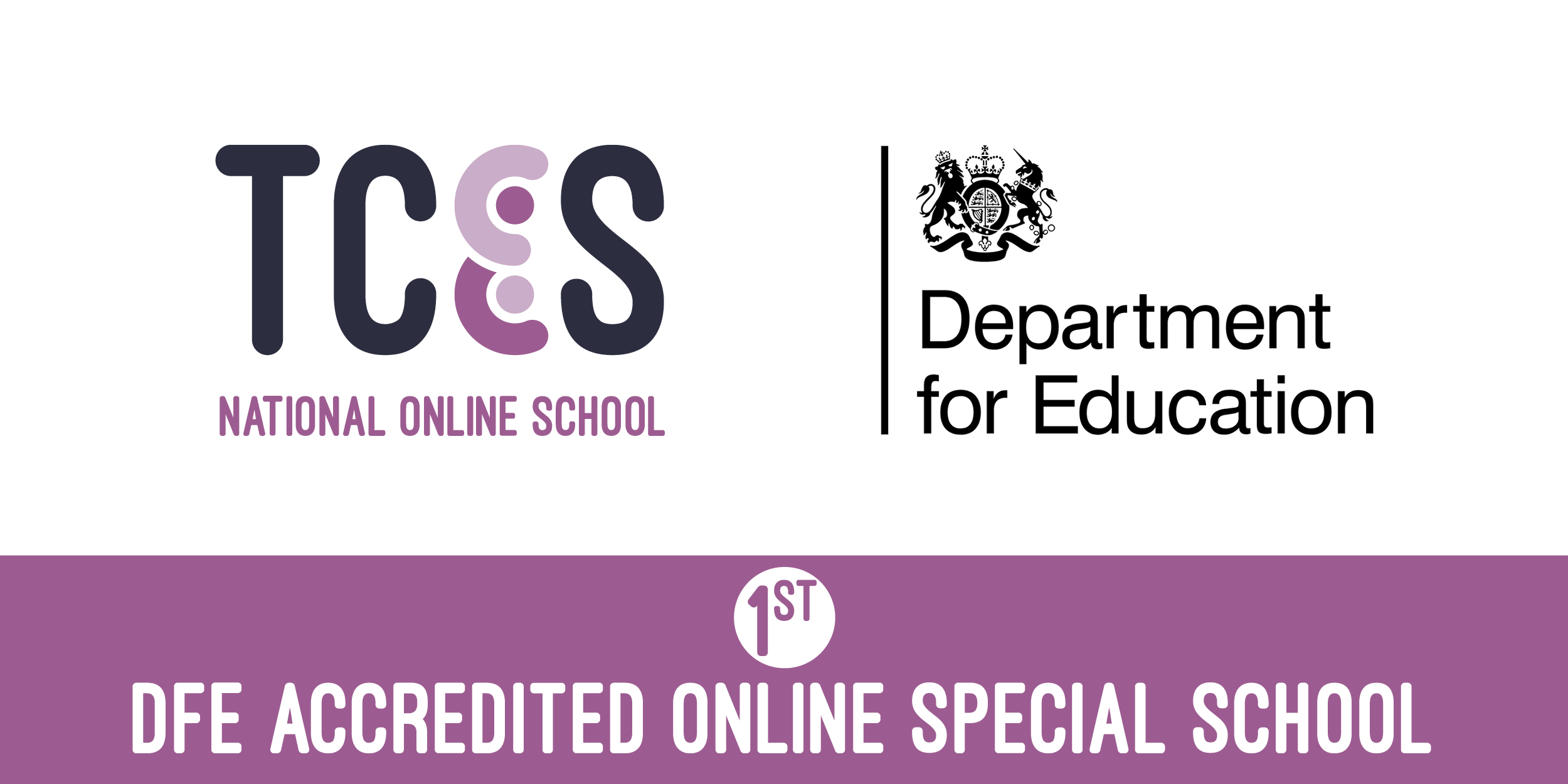DfE Accreditation (OEAS)
In December 2023 TCES National Online School became the first Online Special School to be accredited by the Department for Education under the Online Education Accreditation Scheme (OEAS).
Key extracts from the report include:
- Led by the proprietor, leaders and staff are driven by a strong moral purpose to improve children's academic and pastoral outcomes. They expertly intertwine education and therapy, working tirelessly to identify, reduce, and often, eliminate the barriers to learning that children have faced.
- Tutors sensitively introduce pupils to an academic curriculum appropriate to their needs. Through careful nurturing, they build pupils’ levels of self-confidence and, consequently, their readiness to engage in the range of learning opportunities on offer.
- Live teaching allows for lessons to be interactive. Tutors often use pupils' interests as a starting point and to help them engage in their learning. For example, in one careers session, the tutor used the pupil's interest in ancient history. This led to a positive discussion about the study of classics and what pathways and qualifications may be beneficial to their next steps.
- There is a comprehensive safeguarding policy in place, which is implemented effectively. The policy pays due regard to the statutory guidance for registered schools that is issued by the Secretary of State, and it takes account of the online nature of the setting. The provider’s safeguarding and child protection procedures are strengthened by the effective implementation of other policies, including e-safety/acceptable use of IT equipment, filtering and monitoring, and a code of conduct for social media use.
- Parents are extremely positive about the setting and recognise the impact it is having on their children’s engagement with learning. Parents who spoke with inspectors shared how happy they are that, after difficult experiences in the past, their children’s academic and emotional needs are now being met. One parent stated they felt they had ‘got their child back’.
- On leaving the provider, most pupils are enroled into a registered school or college. No pupils leaving the provider become NEET (not in education, employment, or training).
The full report is available from the Ofsted website here.

Context for Department for Education: Online Education Accreditation Scheme
The Context of OEAS:
The Department for Education ran a consultation on a proposed online education accreditation scheme (OEAS) in 2019, interviewing individuals and organisations who work in the sector, local authorities, parents of pupils who attend online settings and other interested parties. They were aware that providers of full-time online-only education is a growing, but unregulated, market. There was almost unanimous support for a quality assurance scheme in some form, and strong support for basing any scheme on the Independent School Standards (and independent school regulations).
What the DfE hope to achieve:
Whilst the DfE do not promote the idea that online provision is a suitable alternative to traditional settings in all cases, they do, however, acknowledge that there are special circumstances where an online registration is suitable and may represent a child’s best opportunity to receive a full and balanced curriculum.
Recognising this, the OEAS should:
- Give confidence to commissioning bodies [and to parents and Carers]
- Increase protection for vulnerable children
- (Provide information about the sector)
The DfE’s view is that commissioners of full-time online education for school-age pupils in England should use accredited providers for new places, wherever possible.
Who the accreditation scheme is for?
The scheme is open to providers that:
- teach online only on a permanent basis
- provide a full curriculum or represent a child’s main or only source of education
- have at least one full-time pupil of compulsory school age on roll based in England (irrespective of the number of learners based overseas)
- have a physical presence in England
- are registered with Companies House or the Charity Commission
The DfE eligibility criteria:
- Key objective of the scheme is to capture providers who are most likely to educate children who are not in school and also those who may be the most vulnerable
- Eligibility criteria reflects the objective; capture settings with greatest responsibilities towards children and child wellbeing
- Teaching online-only on a permanent basis (This scheme is not for providers whose pupils ordinarily attend a physical site for part of their education – or for whom In-person teaching is delivered by the provider). It also excludes ‘asynchronous’ teaching providers.
- Providing a full curriculum or represent a child’s main or only source of education
- Intended to exclude part-time providers, ‘supplementary’ tutors or other non-FT provision.
- DfE’s view is that these providers work alongside a full-time provider (school) who is ultimately responsible for child’s wellbeing (and likely to be regulated).
- Have at least one full-time pupil of compulsory school age on roll based in England No statutory definition of full time, but an institution is providing full-time education if it is intended to provide, or does provide, all, or substantially all, of a child’s education.
- Relevant factors in determining whether education is full-time include
- The number of hours per week that is provided – including breaks and independent study time
- The number of weeks in the academic term/year that the education is provided
- The time of day it is provided;
- Whether the education provision in practice precludes the possibility that full-time education could be provided elsewhere.
- Have a physical presence in England
- Accreditation of setting, not pupils (as with independent schools)
- This setting must be the premises from which a substantial part of the provider’s leadership or staff operate; and a suitable place for Ofsted to undertake a two-day accreditation visit
- Requiring providers to be registered with either Companies House or the Charity Commission ensures a UK-footprint.
